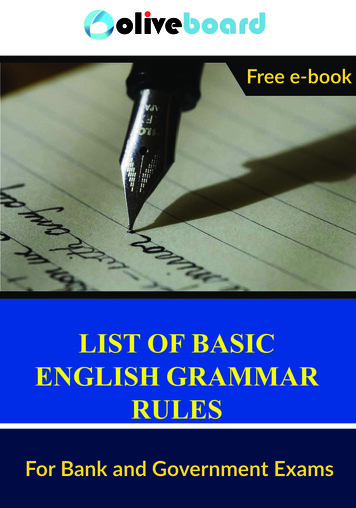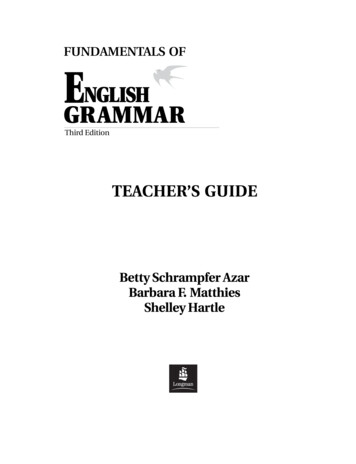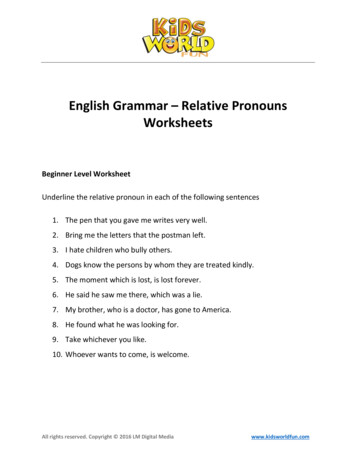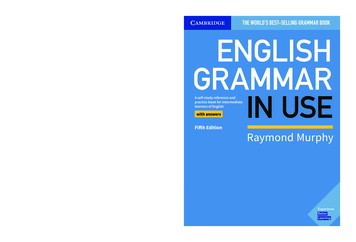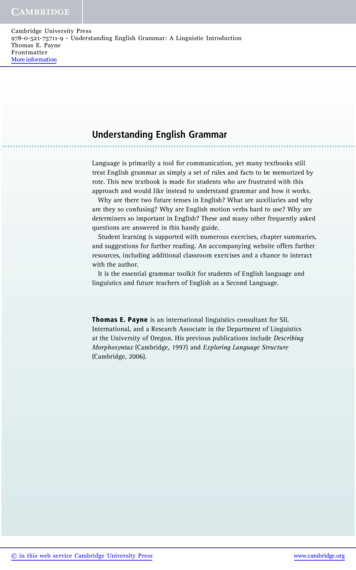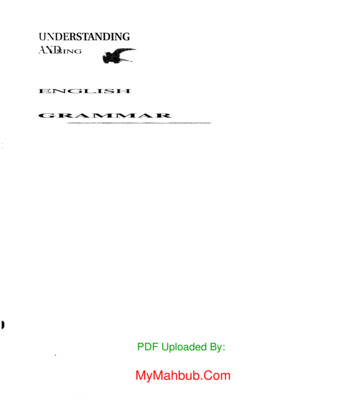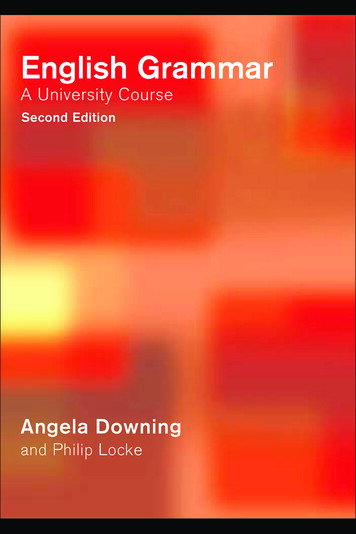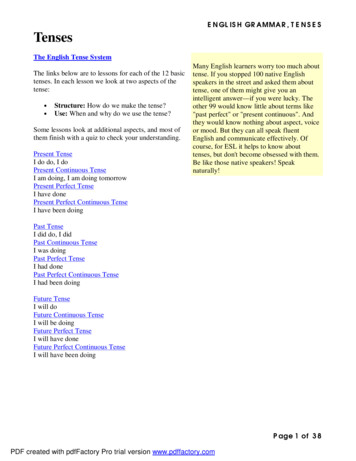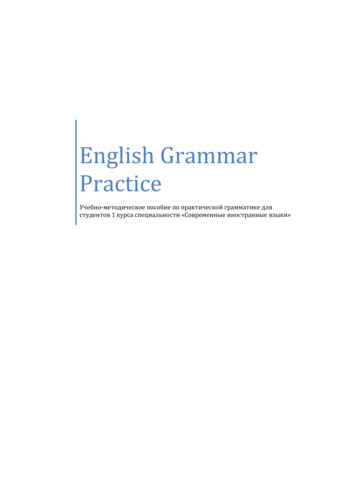
Transcription
English е пособие по практической грамматике длястудентов 1 курса специальности «Современные иностранные языки»
THE VERB “TO BE”“THERE IS (ARE)” CONSTRUCTIONWe use ―there is (are)‖ constructions talking about the existence or absence of people or thingsin a definite place. These constructions have the meaning «есть, имеется, находится,существует». The verb ―to be‖ in such constructions can be used in different tense forms: thereis/are, there was/were, there will be, there has/have been, there had been. The verb ―to be‖ insuch constructions can be used with modal verbs (can, may, must, ought to): There must be adictionary on the shelf. We can also use some other verbs after ―there‖ – to live, to exist, tostand, to lie, etc.: There exist different opinions on the problem.In ―there is (are)‖ constructions we observe the following word order:―there is (are)‖ subject adverbial modifier of time/place.The corresponding Russian sentences begin with adverbial modifiers: There is a telephone in myroom. – В моей комнате есть (имеется) телефон. See the difference: The telephone is in myroom. – Телефон в моей комнате.If the subjects are of different number the predicate agrees with the subject that stands first:There is a table and six chairs in the room. There were some books and a dictionary on the desk.Commentary: ―There are plenty of books on the bookshelves in her study‖ is a sentence with theintroductory ― there‖ which is used to point out the existence of some things in a definite place,the subject of the sentence is expressed by a countable noun in plural.―There isn‘t any soup in the plate‖ ‖ is a sentence with the introductory ― there‖ which is used topoint out the absence of something in a definite place, the subject of the sentence is expressed byan uncountable noun.Ex. 1Use “there is (are)” construction in the necessary tense form.1. a good film on TV tomorrow.2. The book is good. interesting stories in it.3. It was late and many people in the street.4. a flight to London tomorrow?5. no meeting next week. It has been cancelled.6. anybody at home when you came?7. anything strange about him yesterday.8. How many students in your group next year?9. How many mistakes in his last test?10. a lot of clothes in the wardrobe. Choose anything you like.11. no work for him yesterday. He had nothing to do.12. any classes on Friday? No, . It‘s a holiday.13. anything in this box? Let‘s have a look. a pair of shoes and two dresses.14. many guests at the hotel when you stayed there?15. enough food for all of us and we had a nice lunch.Ex. 2Give short answers.1. Are they on holiday? - . They are working.2. Are there any holidays in September? - . It‘s a busy month.3. Were they present at the meeting? - . I saw them.4. Were there many people present at the meeting? - . Almost everybody came.5. Were they on holiday last month? - . They are having a holiday next month.6. Were there many people in the doctor‘s waiting room? - . I was alone.7. Are your friends nice people? - . They are the best people I‘ve ever seen.8. Are there any flowers in their garden? - They are fond of flowers.2
Ex. 3Translate into English.1. На этой улице один новый дом и много старых домов.2. На остановке было много людей. Они ждали автобус.3. У меня в кошельке было слишком мало денег.4. В четверг по телевизору будет интересная программа.5. На этой улице всегда такое сильное движение?6. В коробке ничего не было. Она была пуста.7. Здесь есть стоянка для машин? – Да. Она за тем домом.8. Сколько марок будет в твоей коллекции, если ты купишь эту? – Не много.9. Словарь на полке. Возьми его. – На полке два словаря. Какой взять?10. В меню есть какие-нибудь блюда итальянской кухни? – К сожалению, нет.11. В этой книге не много информации о Бразилии.12. В этой газете есть интересные статьи? – Да, на третьей странице есть оченьинтересная статья.13. Где у вас телефон? – Телефон в гостиной. Можешь позвонить.14. Почему на столе так много тарелок? К обеду будут гости?15. Краски было недостаточно, и я не смог закончить работу.16. Что у тебя в комнате? – Там кровать, шкаф и другая мебель.17. Здесь достаточно материала, чтобы сшить такое платье.18. Дальнейшего обсуждения не будет.19. Сколько бензина в баке? – В баке достаточно бензина.20. Они туристы? – Да. В мае здесь всегда много туристов.HAVE – HAVE GOTIn the English language the verb ―to have‖ can be used as:1) a notional verb to express possession (I have a flat of my own.)2) a modal verb (I have to go to the shop, we‟ve run out of bread.)3) an auxiliary verb (He has just come.)There are two ways to form negatives and questions:They don‟t have any children. They haven‟t got any children.Does Ann have a car? Has Ann got a car?But when the verb ―to have‖ is used in the following expressions: to have dinner/breakfast, tohave coffee/tea, to have a bath/ a shower, to have a shave/a wash, to have a rest/ a sleep/ adream, to have a holiday/ a good time, etc. in negative and interrogative forms it takes theauxiliary verb ―to do‖:Do you have tea or coffee for breakfast? Where does he have dinner?Note that ―have‖ stresses the idea of regularity, ―have got‖ is linked with ―now‖ and means aparticular thing. In spoken English the form ―I‟ve got‖ is used almost universally for ―I have‖ inthe sense of ―I own (possess)‖: I have a cup of tea for breakfast in the morning (usually). Ihaven‟t got tea for breakfast this morning.Ex. 4Make the following sentences negative and interrogative.e.g. The Browns have a nice garden. – Do the Browns have a nice garden? The Browns don‘thave a nice garden.e.g. He‘s got three children. – Has he got three children? He hasn‘t got three children.1. Tom has a large country house.2. They usually have lunch at one o‘clock.3
3. Mary has got two brothers.4. I have a shower every morning.5. Helen and John have got a three-room flat.6. Little Ben has got a bicycle.7. Kate always has tea for breakfast.8. My Mum usually has a holiday in summer.9. The child has dot coloured pencils.10. George has a family of his own.Ex.5Insert have or have got in the necessary form.1. she any grandparents? – Yes, both her Granny and Granddad are still alive.2. Did you go to Mary‘s party? – Oh, yes, we a grand time.3. As far as I know, he lives with his relatives. He a flat of his own.4. What you usually for breakfast?5. If you work hard, I‘m sure you any problems at the exam.6. May I a look at this book, please?7. I enough time to do the shopping yesterday, so I‘ll have to do it tonight.8. I‘m sorry, I any present for you. – Never mind.9. I couldn‘t answer the telephone as I was a shower.10. Could you lend me a fiver, please? – Oh, sorry, I any money on me.11. I think I a holiday in August this year.12. their daughter dark or fair hair? – Actually, she‘s red.13. I dinner yesterday, I didn‘t feel quite well.14. She so many clothes she doesn‘t know where to put them all.15. you a good rest? – Yes, I really enjoyed it.Ex. 6Translate into English.1. Я ничего не пил за ланчем, потому что у меня сегодня очень болит голова.2. У тебя есть фотоаппарат? Давай я тебя сфотографирую.3. Я не буду устраивать вечеринку в день рождения, так как я уезжаю.4. У Тома большая семья? – Да, у него брат и две сестры.5. Я не могу дозвониться до Кейт. – Я только вчера с ней разговаривала.6. Мистер Браун очень занят, у него сейчас нет времени разговаривать с вами.7. Вы хорошо погуляли в воскресенье? – О, да, погода была прекрасная.8. У тебя много занятий по средам? Обычно 3 или 4 лекции.9. У нее дома совсем не было цветов, и мне это не понравилось.10. В этом магазине нет свежего хлеба. Пойдем в другой.11. А у тебя есть собственная комната в вашей новой квартире? – Да, и она довольнобольшая.12. Где мне найти мистера Пита? – Он вышел. У него деловой ланч с клиентом.13. Если вечеринку сделать в субботу, то гости не будут рано расходиться. Им же ненадо будет рано вставать в воскресенье.14. У тебя есть брат или сестра? – У меня старший брат.15. Сегодня утром у меня не было времени даже выпить кофе, поэтому я такая сонная.16. Вы хорошо долетели? – Да, спасибо.17. Не имею ни малейшего представления, о чем вы говорите.18. Что случилось? Ты так взволнована! – Сегодня вечером у меня первое свидание.19. Разве у тебя никогда не болели зубы?20. Марк как раз выкуривал последнюю сигарету перед сном, когда в дверь вдругпостучали.4
PRESENT INDEFINITEPRESENT ACTIONS:1) It is used to denote a habitual, customary, repeated action (the repeated character of the actionis shown by the adverbials of frequency always, usually, generally, occasionally, frequently,sometimes, often, twice a year, once a week, every day, every other day, once in a while, fromtime to time, hardly ever, seldom, rarely, daily, monthly, etc.e.g. They always go out on Sundays.2) It is used to denote permanent characteristics and properties, hobbies, habits and customs ( actions or states characterizing a given person).e.g. As a hobby he designs and makes paper airliners. British people drink a lot of tea.3) It is used to denote universal truths (smth which is eternally true) and generalizations(proverbs and sayings, rules) and common statements.e.g. Summer follows spring. Extremes meet. An apple a day keeps the doctor away.4) It is used to show that the action is going on according to time-tables, itineraries, workinghours.e.g. The shop opens at 9 a.m. and closes at 8 p.m.5) It is used to denote actions going on at the present moment when the action as such and notthe progress is important or because the verb doesn‘t admit of the continuous tense form ( stative verbs, denoting feelings, opinions like, know, see, agree, believe, hear, think, taste,understand, want, wish, prefer, realize, depend, cost, belong, etc.)e.g. My son wants a bike, but I don‟t think he should have one. I see George in the street. I livein Minsk. I don‟t understand what you mean.6) It is used in stage directions, sports commentaries, instructions.e.g. Becker serves to Lendle.PAST ACTIVITIES:7) It is used in summaries of historical events (the so-called ―historic present‖).e.g. In May 1979 Margaret Thatcher becomes the first woman Prime Minister in the history ofGreat Britain.8) It is used in plots of films, plays, books, in reviews.e.g. Pavarotti sings wonderfully in this opera. The events go rapidly. Jean meets Paul and theyfall in love with each other passionately.9) It is used in informal story-telling (jokes, anecdotes).e.g. So the guy goes to the pub and orders two beers. At that moment the door opens and hiswife appears.10) It is used in headlines.e.g. People Say No to Terrorism.FUTURE ACTIVITIES11) It is used in schedules, time-tables, plans.e.g. The train leaves at 10.5
12) It is used in subordinate clauses of time and condition (after conjunctions when, after, before,as soon as, until, if, in case, unless) to denote a future action.e.g. I‘ll phone you as soon as I come back home. If the weather is fine we‘ll go for a walk.Spelling rules of the 3rd person singular formAccording to the general rule the 3rd person singular is formed with the help of the ending –s(works, drives, plays, runs).-s changes to 1) –es for verbs which end in –o (does, goes) and in –s,-x,-ch,-sh (misses, catches,pushes judges, finishes, manages), 2) –ies for verbs which end in –y with a preceding consonant(study – studies, fly – flies). But if the letter –y is preceded by a vowel, only –s is added (stay –stays, play – plays, say – says).Ex. 7Write the third person singular of these verbs. Pronounce them correctly.Ache, announce, arise, believe, blush, bow, box, brush, buy, charge, clarify, complete, cough,cry, deny, destroy, excite, expect, express, fix, fry, go, guess, lie, light, look, lose, memorize,reach, receive, rush, say, sew, smash, sneeze, spring, switch, touch, watch, wrap, yawn.Ex. 8Match the sentences with the meaning of the tense-forms in each case.1. This parrot looks at him attentively anda) general truths, a common statethen asks b) a sports commentary2. You just press the button and wait c) a headline3. Dogs make better pets than cats.d) a habitual action4. Agassi serves – it‘s out!e) an instruction5. I always meet her on the corner of thef) an itinerarystreet.g) a past event in story-telling6. President receives huge welcome.h) a recipe7. You arrive at the hotel at about 7.00i) permanent characteristicsand have your evening meal at 8.00.8. Water boils at 100 degrees C.9. First I put a lump of butter into thefrying pan and light the gas; then Ibreak three eggs into a bowl Ex. 9Complete by using question tags.1. He doesn‘t like socializing with a lot of people, ?2. John‘s business partner is very pleased with him, ?3. Peter never panics about anything, ?4. He hardly ever feels relaxed and cheerful, ?5. The Chaineys have a cottage in the mountains, ?6. Her granny doesn‘t sleep well, ?7. Bruce usually acts quite bravely, ?8. There‘s a wide variety of events at this year‘s festival, ?9. Jean hardly ever makes spelling mistakes, ?10. The children often play in the open air, ?11. It seldom snows in the south of England, ?12. He never shows off in front of other people, ?6
Ex. 10Restore the right word order in the following proverbs. Find their Russian equivalents.1. Boils/a/never/watched/pot2. Lining/dark/has/silver/every/a/cloud3. Learn/is/too/it/to/never/late4. Shines/the/hay/while/make/sun5. Worm/bird/the/the/early/catches6. Cooks/the/many/too/spoil/broth7. Run/still/deep/waters8. Away/an/doctor/a/the/keeps/apple/day9. Feather/birds/together/of/flock/aPAST INDEFINITE1) It is used to denote an action performed within a period of time which is already over. Thetime of the action is indicated by the adverbial of past time: ago, last year, yesterday, the otherday, in 1995, etc. a complete past actione
English Grammar Practice Учебно-методическое пособие по практической грамматике для студентов 1 курса специальности «Современные иностранные языки»
